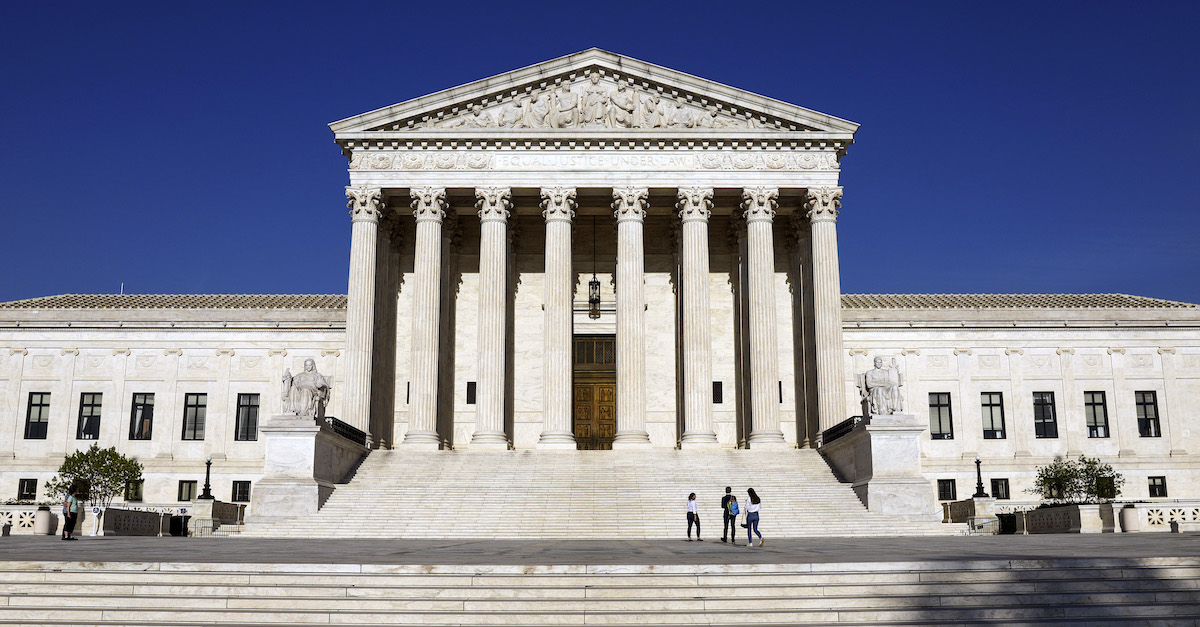
The U.S. Supreme Court building.
The Supreme Court of the United States granted certiorari in three new cases Monday. The cases will be briefed and argued next term, when recently confirmed SCOTUS nominee Ketanji Brown Jackson will begin her tenure on the high court amid Justice Stephen Breyer’s retirement.
Here’s what you should know about the three cases.
Nursing Home Lawsuits
In Health and Hospital Corporation of Marion County, Ind. v. Talevski, a state-owned nursing home asks the justices to weigh in on whether a patient has the right to wage a private lawsuit against the home under 42 U.S.C. § 1983.
Gorgi Talevski is a dementia patient who exhibited problematic behaviors after his wife Ivanka placed him in a long-term care facility in a state-owned Valparaiso, Indiana.
Talevski’s petition for certiorari reads as follows:
Talevski repeatedly acted in a violent and sexually aggressive manner toward members of VCR’s staff and female residents. These were not minor infractions; among other things, Talevski repeatedly (and inappropriately) touched female residents, led them into his room and closed the door, and tried to stab VCR staff members with knives and forks.
Talevski’s doctor prescribed multiple medications intended to ameliorate his behavior, but Talevski’s family members disagreed with the choice to further medicate him, arguing that the medication worsened the patient’s overall medical condition. After multiple disagreements over medication and a proposed transfer of Talevski, his family filed a grievance on his behalf with the Indiana State Department of Health (ISDH). Talevksi filed a private lawsuit that alleged civil rights violations of 42 U.S.C. § 1983 for violations of the Federal Nursing Home Reform Act (FNHRA), a federal statute enacted under the spending clause. FNHRA establishes minimum standards of care that nursing homes must follow in order to receive federal Medicaid funds.
The district court dismissed the action for failure to state a claim on the grounds that FNHRA does not authorize private lawsuits that are enforceable under § 1983.
The U.S. Court of Appeals for the Seventh Circuit reversed and sided with Talevski. The nursing home now asks that SCOTUS review the Seventh Circuit’s decision to determine whether the Spending Clause of the Constitution gives rise to the right to bring private lawsuits against government-funded entities such as the nursing home.
Who Is Liable for Fraud in Bankruptcy Context?
In Bartenwerfer v. Buckley, the appellants ask the Court to resolve a split among the appellate courts over whether liability for fraud by one partner may be imputed to another partner for purposes of bankruptcy.
Spouses David and Kate Bartenwerfer renovated a house in San Francisco, California, then sold it to Kieran Buckley. After Buckley learned that David failed to accurately communicate with him about the condition of the house, he sued and won a judgment for nondisclosure of material facts. The Bartenwerfers then filed for bankruptcy.
There remained an outstanding question, however, as to whether David’s fraud should be imputed to Kate for the purposes of bankruptcy although Kate appeared to be innocent as to the fraud. The U.S. Court of Appeals for the Ninth Circuit ruled that regardless of Kate’s knowledge of the fraud, the lawsuit-related debt is not nondischargeable in bankruptcy.
Overtime Wages
In Helix Energy Solutions v. Hewitt, the justices will review an overtime claim brought by a highly-paid employee against an oil company, potentially resolving a circuit split over which employees are exempt from federal overtime requirements.
Michael Hewitt employment claim for unpaid wages against Helix Energy Solutions Group, Inc. Hewitt was a supervisor on offshore vessels of oil and earned between $143,000 and $248,000 each year. After Helix fired Hewitt, Hewitt sued under the Fair Labor Standards Act (FLSA), arguing that he was entitled to retroactive overtime pay for every week in which he had worked over 40 hours.
The FLSA exempts highly-compensated employees and executives from overtime requirements. Although there is no disagreement about Hewitt’s earning an annual amount that would be exempted from the requirements, there is a dispute over the legal effect of his daily wage rate. Hewitt earned at least $963 per working day, and was typically paid based on that daily (as opposed to a weekly) rate.
The U.S. Court of Appeals for the Fifth Circuit ruled that Hewitt was non-exempt and could proceed with his overtime claim because he was paid on a daily rate. Not only did both the appellants and the dissenting Fifth Circuit judges call the ruling “counterintuitive,” but the ruling in Hewitt’s favor is at odds with opposing rulings from the First Circuit and Second Circuit.
[Image via by Kevin Dietsch/Getty Images]
Have a tip we should know? [email protected]